Are you happy?
Indeed, there are various definitions to being “happy” for every single individual.
But generally, as a country, it seems that Singaporeans have become less and less happy over the past decade.
This is the result discovered by the 2022 Quality of Life Survey by academics from the National University of Singapore Business School – Associate Professor Tambyah Siok Kuan, honorary fellow Tan Soo Jiuan and PhD candidate Yuen Wei Lun.
They published their findings in a book called “Happiness and Wellbeing in Singapore: Beyond Economic Prosperity” last year in September.
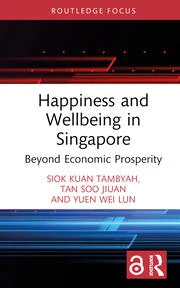
What The Survey Is About
The 2022 Quality of Life (QOL) Survey was conducted from June to July in 2022.
It is a large-scale survey comprising 1905 citizens, aged 21 to 79, and reveals insights into Singaporeans’ overall satisfaction with life and various aspects of life.
As this is after the global pandemic COVID-19, this survey examined the impact of COVID-19 on the wellbeing of Singaporeans, getting Singaporeans to answer the questions in view of reflecting on the last two years of pandemic.
Prior to the 2022 survey, the QOL Survey was also conducted in 2011 and 2016 respectively.
Singaporeans Are Getting Less Satisfied With Life
Comparing the results in 2022 with the ones in 2016 and 2011, Singaporeans have enjoyed life a lot less and have felt a decreased sense of achievement, control and purpose.
As compared to the 2011 QOL Survey, the levels of happiness, enjoyment and achievement have fallen by half or more than half 11 years later in the 2022 QOL Survey.
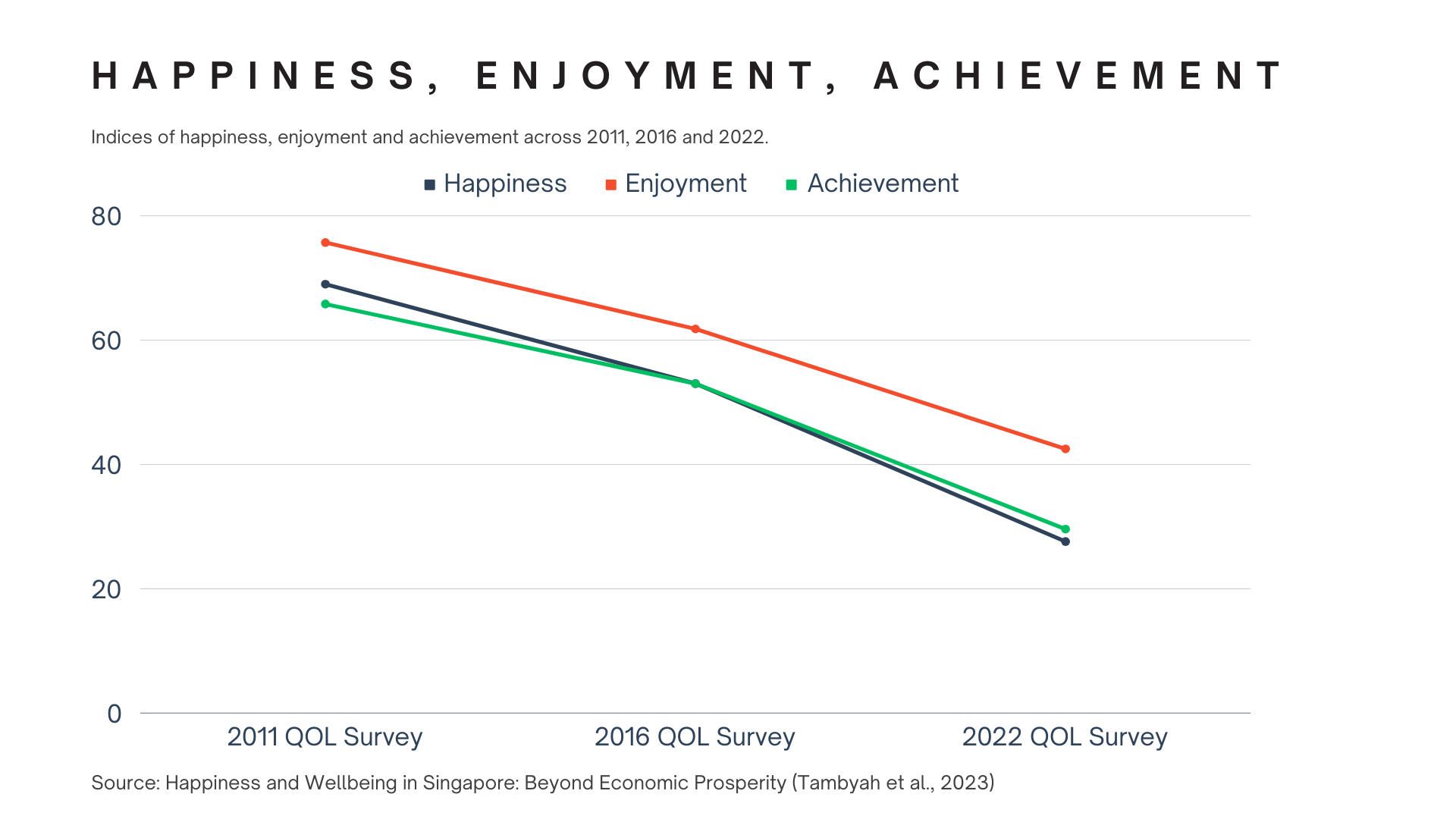
This is correlated with Singaporeans feeling like they have lost control and purpose of their lives.
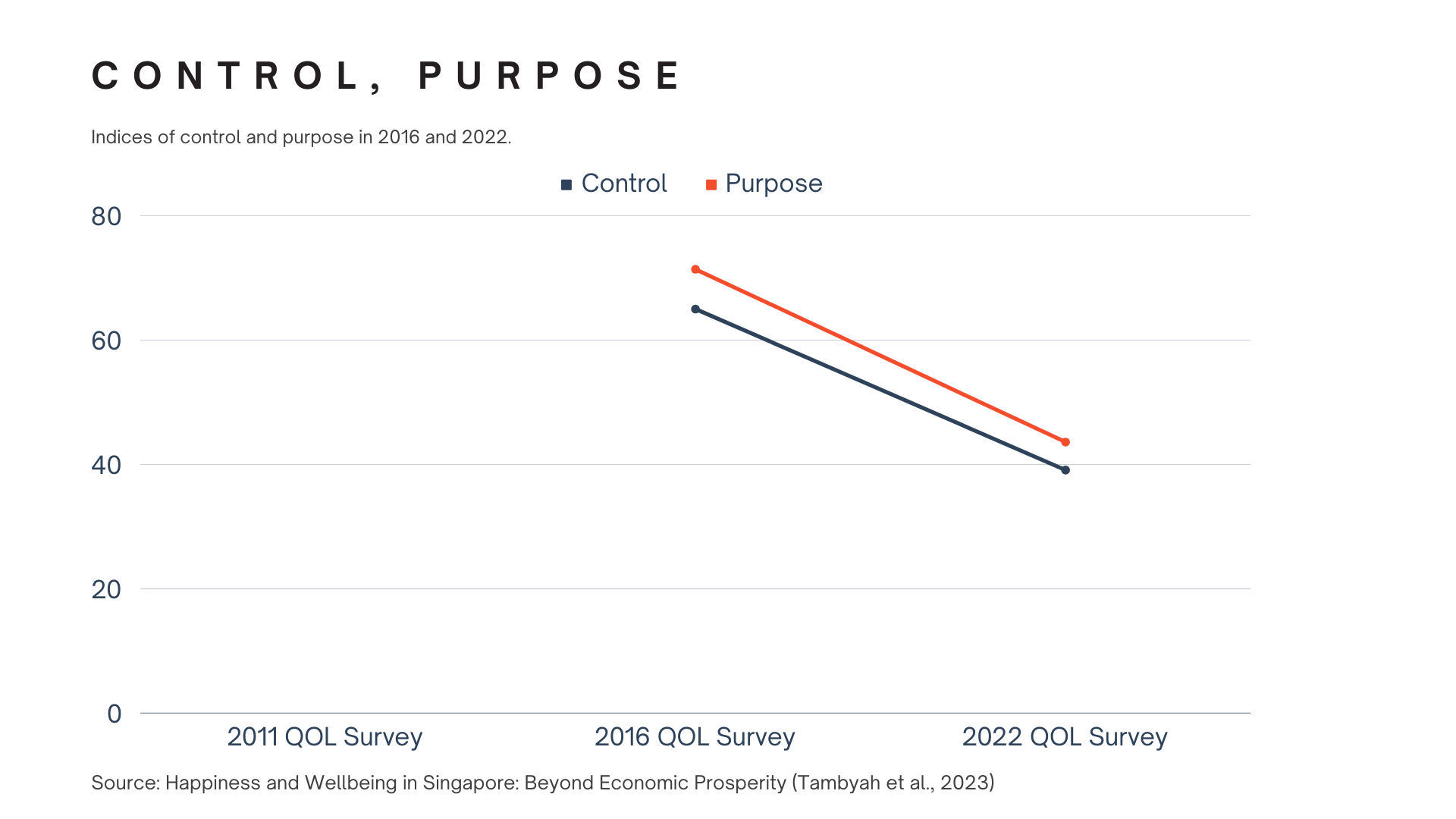
The worry is that the decrease is steady, and not just a sudden sharp drop because of sudden events like COVID-19.
In 2022, the highest mean score in the area of satisfaction with life is 4.18% only, responding to the statement “I am satisfied with my life”.
Back in 2016, that was a way higher percentage of 4.51%.

Other indicators include whether Singaporeans feel that they have important things they want in their lives, showing their sense of purpose in life.
Every single indicator has seen a decrease from 2016 to 2022.
People Are Still Optimistic
Yet, many Singaporeans remain optimistic about their future life.
In the survey, the respondents were also asked to evaluate their present and future lives on a ladder with number 0 (worst possible life) to 10 (best possible life).
Guess what the results were?
Back in 2016, when Singaporeans were at the 6th rung, they thought their lives would improve to the 7th rung by 2021, but in reality, it remained at 6th rung in 2021.
In 2022, Singaporeans didn’t rank their future lives to be any lower, and expected their lives to have a mean rating of 6.45 by 2027.
Most Satisfied With Relationships With Loved Ones
When someone asks, “are you satisfied with your life?”, we often find ourselves answering “depends on which part of my life”.
In reality, some things go well, and some things don’t.
Overall for the 2022 QOL Survey, everything went less well in all domains as compared to previous years.
Not to mention, the satisfaction level itself is all around 4, which is only “slightly agree”, for the year of 2022.
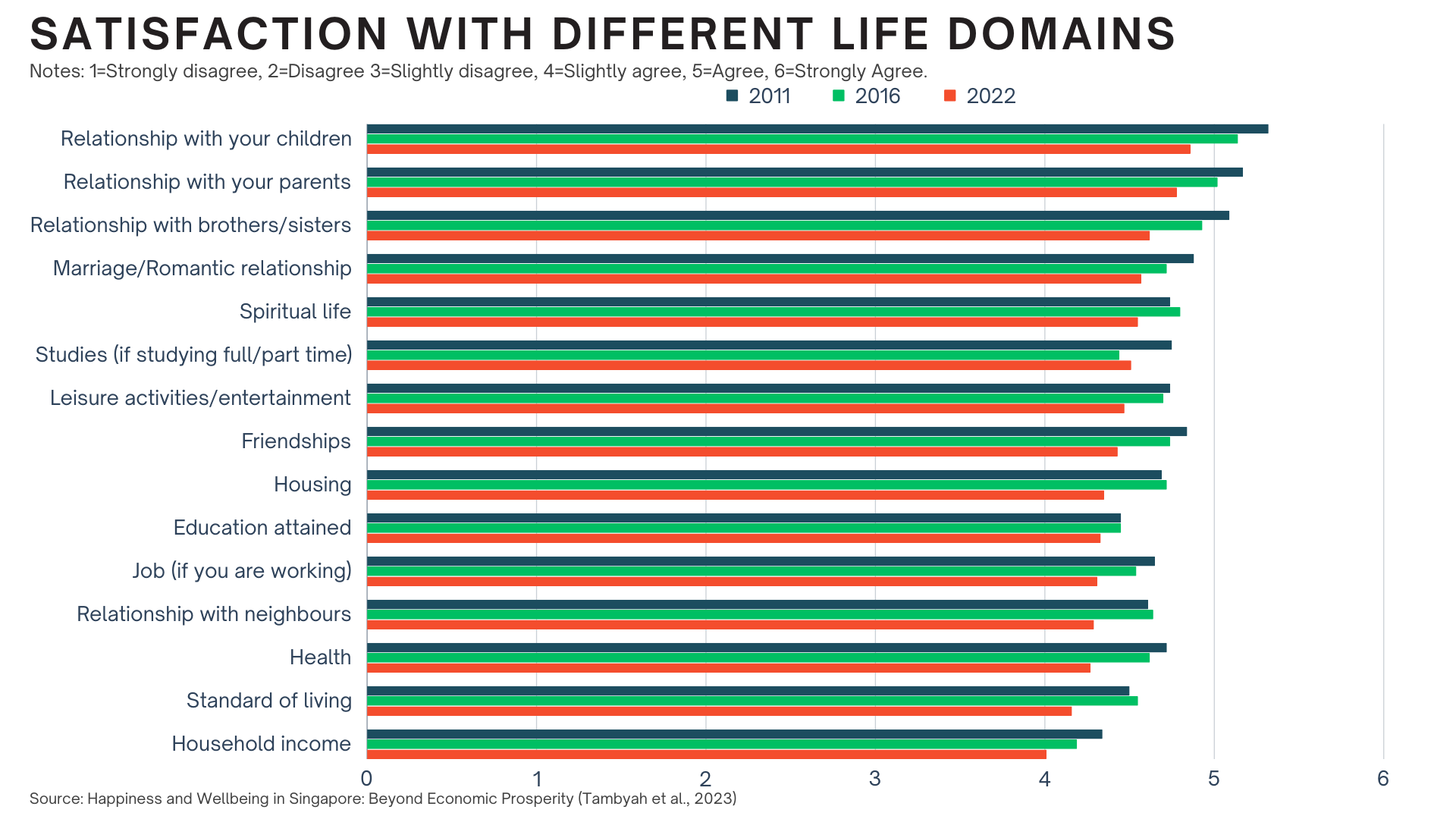
In the 2022 QOL Survey, the thing that went well satisfactorily for most Singaporeans was their relationship with their children, followed by with their parents, their siblings, and then their romantic partners.
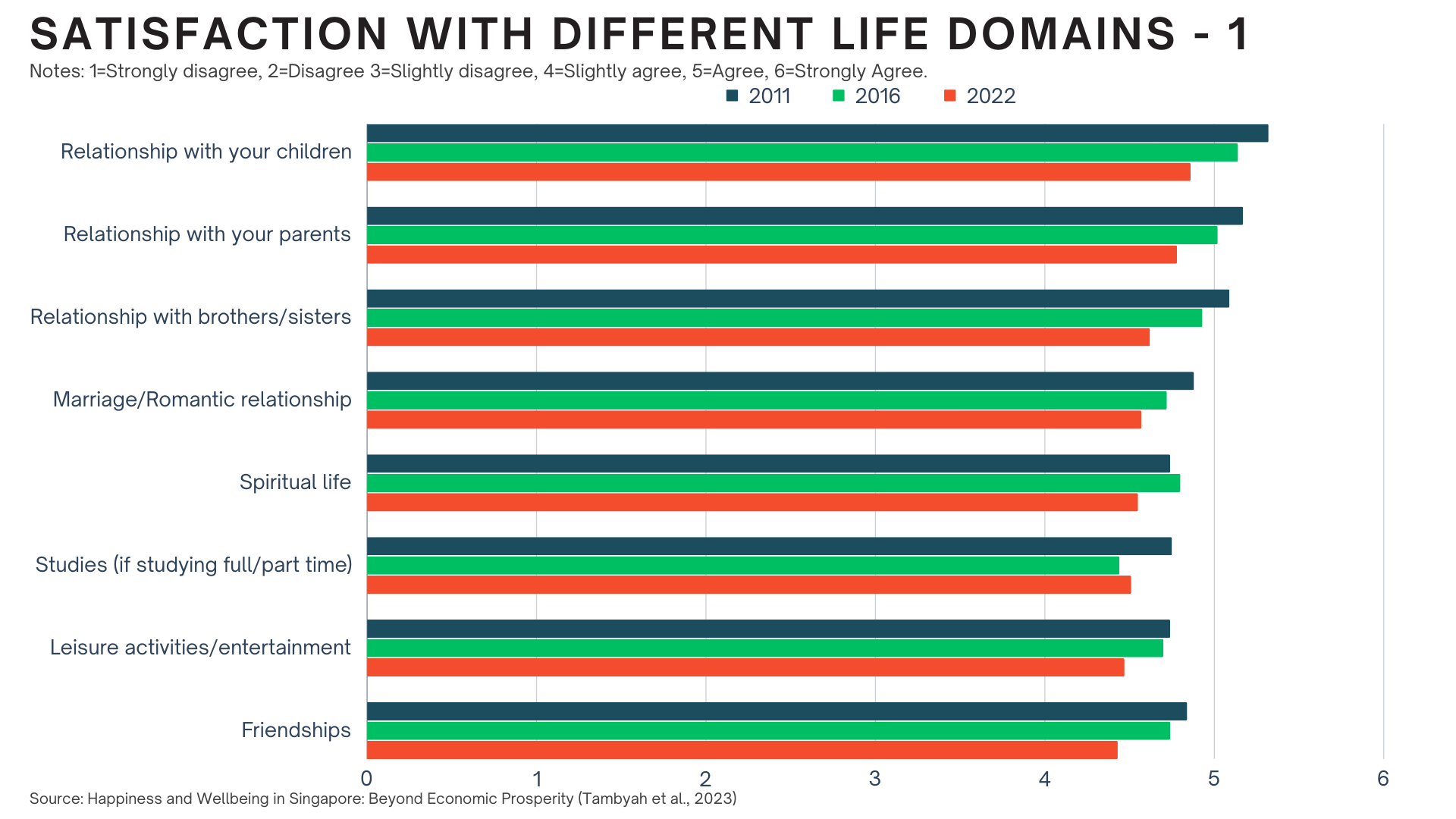
In fact, these life domains have remained consistently in the top rankings over the years since 2011.
Generally, Singaporeans who are married, or are more highly educated, were more satisfied with their relationships with their parents and siblings.
Meanwhile, the younger Singaporeans were less satisfied with the relationships with their parents.
Interestingly, the satisfaction level of one’s relationship with their friends has dropped from the 5th position that was clinched in 2011 and 2016, to 8th position in 2022.
Maybe this is exactly like what Muhammad Ali had said about friendship – that it is “the hardest thing in the world to explain.”
Least Satisfied With Standard of Living
What about the least satisfactory domains?
Well, similarly, these domains remained pretty much the same over the years.
And if you haven’t guessed it, it is the satisfaction with one’s job, health, and standard of living.

Generally, females were less satisfied than males regarding household incomes and health.
And in the very last place, consistently over the years, is the satisfaction with household income.
And for this, demographic factors did not affect its scoring. Female or male, old or young, all ranked household income as the least satisfactory domain.
That’s pretty ironic, when Singapore is ranked third in the average monthly disposable salary after tax deduction, at $5188.69 per month, according to a report by The Business Standard.
Living in a capitalist world, money does seem to be a very important factor to make someone happy.
Apparently, you need to have at least $5150 per month to be happy.
Back in a 2021 MSN study, the Price of Happiness Index stipulates that a Singaporean’s happiness would cost around S$61,810.87 (US$46,078) a year, or around S$5,150 in monthly terms.
Democratic Rights
In the 2022 QOL Survey, Singaporeans were polled based on six metrics with regards to their perception of democratic rights.
The six metrics include:
- The right to vote
- The right to participate in any kind of organisation
- The right to gather and demonstrate
- The right to be informed about the work and functions of the Government
- The right to freedom of speech
- The right to criticise the Government
Of the six metrics, Singaporeans were most satisfied with the right to vote, consistent with the 2011 and 2016 QOL surveys.
On the other hand, Singaporeans were least satisfied with the rights to criticise the Government.
I mean, do we not know what the consequences of doing that are? Even just criticising a public servant can land you in jail.
As per the results in the study, as the index of all of these metrics increase, the satisfaction level increases.
But Does Money Really Make Us Happy?
Overall, the 2022 QOL Survey did find a positive relationship between Singaporeans’ household income and their satisfaction with life and overall quality of life.
However, take a closer look at the survey data, and you might realise that that might not be the case.
Of course, if household income increases, the overall satisfaction in life may increase.
But when we look at the demographics of the people who were responding in the survey, we see that the richer people actually were less happy than the ones in a relatively lower income group.
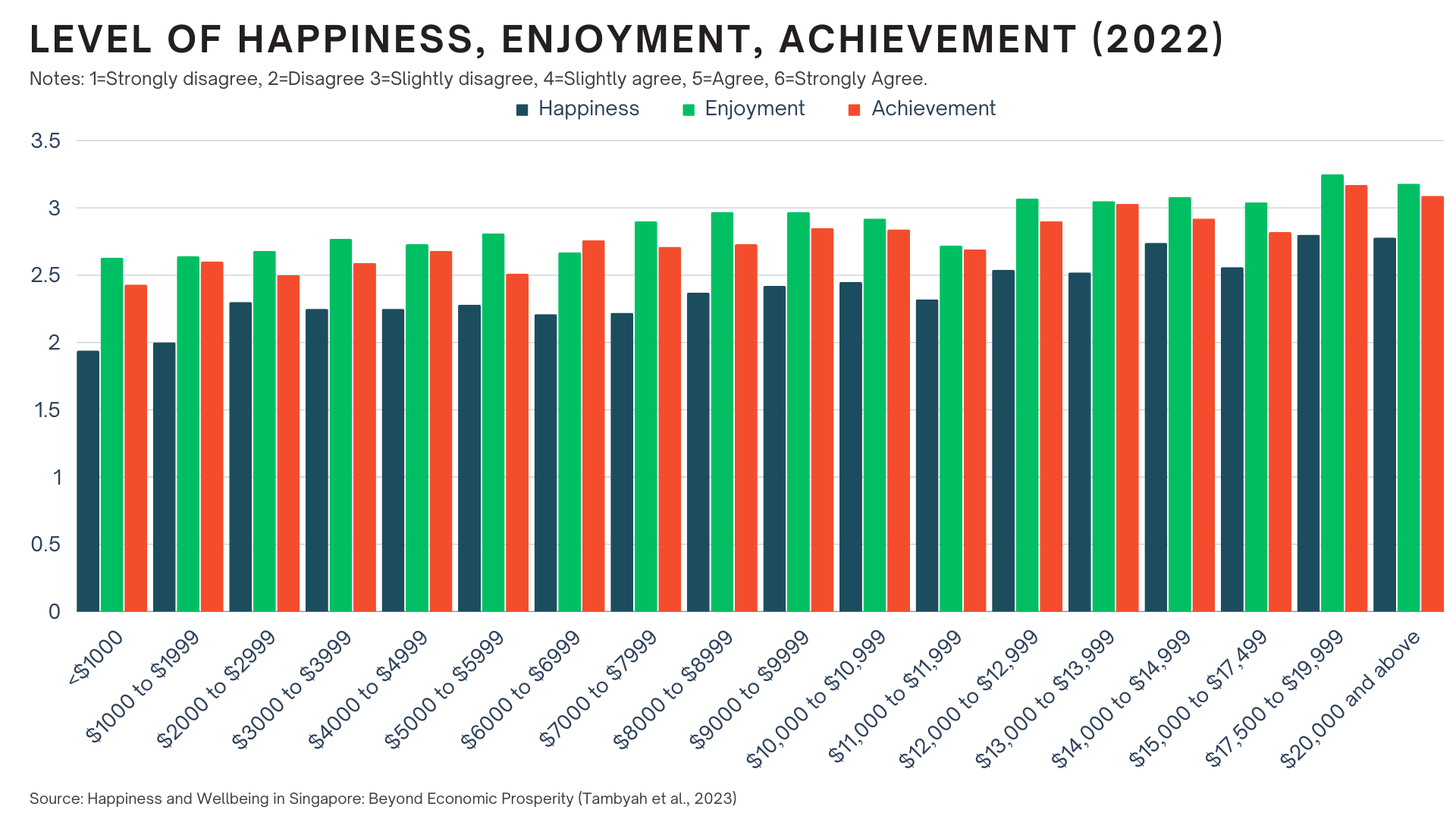
Singaporeans in the bracket with a monthly household income of between S$11,000 and S$11,999 had a mean happiness index of 2.32, while respondents in the bracket with a monthly household income of between S$9,000 and S$9,999 reported a mean happiness index of 2.42.

So, we see that money is certainly not everything.
But generally, those who havea more balanced view of life were generally more satisfied.
The Happiness in Giving
An interesting phenomenon brought up in the survey is the “psychological flourishing” phenomenon, which has become more important in recent years.
It is an important aspect of wellbeing that means the happiness generated by the contributions one has made to the society, as well as the happiness of others.
While there are definitely many reasons and domains of why Singaporeans can be getting less happy over the years we see in the survey, at the end of the day, what matters is where we’re at, and how we are going to change the future.
And when we put the point of happiness on giving, we know that there is always a way to be happy.
Most importantly, when we have a more balanced view of life, we know that it’s going to be different.
Over in TikTok, there’s a drama involving property agents that’s caused by us. Here’s what happened:

Read Also:
- Van Driver Charged After Fleeing Police Inspection & Biting Officer in Geylang
- RI Student Wears Inappropriate Clothes on Racial Harmony Day; Principal Claims No Intention to Offend
- Secret Service Director Kimberly Cheatle Resigns Over Lapses During Attempted Assassination on Trump
- CrowdStrike Apologises for IT Outage with US$10 Uber Gift Cards; They Don’t Work
- Missing 6-Year-Old Girl Reunites With Family; Had Not Eaten or Drank in 3 Days
Advertisements
